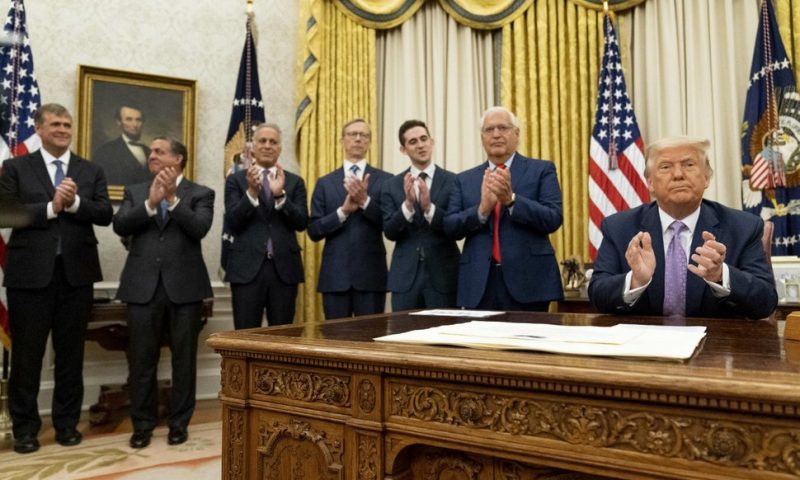The agreement, which was immediately panned by Palestinian leaders, comes as Trump needs a foreign policy win amid falling poll numbers.
PRESIDENT Donald Trump on Thursday announced he had helped forge a new agreement between Israel and the United Arab Emirates to open formal diplomatic ties in what he described as a “huge breakthrough.”
To be known as the Abraham Accords according to White House officials, the deal begins the process of creating formal diplomatic relations between the two Middle East nations for the first time, potentially adding to two other peace treaties Israel has with other countries in the region – Egypt and Jordan. It also calls for Israel to suspend declaring sovereignty over disputed territory also claimed by the Palestinian National Authority.
The deal would call for the two countries to exchange embassies and ambassadors, and grant Muslims greater access to the historic al-Aqsa Mosque in Jerusalem.
Multiple analysts, including within Israeli media, observed that the deal serves as a much-needed foreign policy win for Trump going into November’s presidential election as he trails presumptive Democratic nominee Joe Biden by a wide margin in almost all polling.
It also comes at a time of political turmoil for Israel Prime Minister Benjamin Netanyahu, as widespread protests continue and the spread of the coronavirus mounts pressure on his shaky coalition government.
Netanyau was scheduled to address the news shortly after Trump’s announcement. A statement from his Likud Party said moments before that the prime minister is “committed to sovereignty and to the Land of Israel.”
Local news reported the embattled Israeli prime minister suddenly left a high-profile meeting on the coronavirus to address a “national emergency” moments before Trump’s tweets about the agreement, though it was not immediately clear whether they were connected.
Trump tied the announcement to his administration’s efforts to develop a peace plan for the Middle East, led by senior White House adviser and his son-in-law Jared Kushner. That plan, revealed in a White House ceremony in January, was considered “dead on arrival” by most analysts as it contained no input from Palestinian leaders and overwhelmingly catered to Israeli priorities.
The United Arab Emirates’ ambassador to the U.S. attended that ceremony at the White House.
UAE Crown Prince Mohammed bin Zayed Al Nahyan said in a tweet that he reached the agreement in a phone call with Trump and Netanyahu that would “stop further Israeli annexation of Palestinian territories.”
“The UAE and Israel also agreed to cooperation and setting a roadmap towards establishing a bilateral relationship,” he wrote.
An unnamed Palestinian official slammed the deal, saying it rewards existing Isareli occupation of contested territory, the Associated Press reported. A spokesman for the Palestinian militant political group Hamas accused the UAE of “stabbing” Palestinians in the back after agreeing to the deal.
Speaking to reporters at the White House, Trump described his phone call with Netanyahu and Crown Prince Mohammed as “like love,” and that the deal “kept us out of war.”
He said the U.S. is “talking to Israel right now” about further measures to address Palestinian concerns about Israeli annexation of contested land.
A White House statement said delegations from Israel and the UAE will meet in the coming weeks to discuss “investment, tourism, direct flights, security, telecommunications, technology, energy, healthcare, culture, the environment, the establishment of reciprocal embassies, and other areas of mutual benefit.”
“Opening direct ties between two of the Middle East’s most dynamic societies and advanced economies will transform the region by spurring economic growth, enhancing technological innovation, and forging closer people-to-people relations,” the statement read.
Noted Iran hawks applauded the deal, and said it will help align military powers against a common foe.
“The peace deal between UAE and Israel is an extraordinary breakthrough that will bring even greater opportunities for regional peace and prosperity in its wake,” Mark Dubowitz, the chief executive of the Foundation for the Defense of Democracies think tank, said in a statement. “The mullahs in Iran are the only losers.”

